INTERVIEW: FIRE & DUST MEETS ASH DICKINSON
STRANGE KEYS BY ASH DICKINSON
Burning Eye Press
ISBN 978-1-909136-70-0
£9.99/101 pages
on visiting a school, as a rule
remember Indiana Jones
and the Last Crusade
when selecting a cup –
choose wisely
simpler, plainer
one its own potter couldn’t love
something with a carbuncle
a growth in its glaze
freebies and throwaways
remember – cups of Christ never advertise
local haberdashers
beware cracks, embedded rings
such vessels may not seem loved
but they are lived-in, their handles
gripped like the handrails of a boat
a hoop of hope, a life-ring keeping one afloat
through tempestuous Ofsteds
a call for heads, the pirate Gove
daydreams set sail in spiralling steam
a comforting watchtower
through every shipwrecked hour
marking time
never, ever
take one bearing a person’s name
or a football crest
or David Hasselhoff
owners of these mugs
will hunt you like an elk
it matters not a jot you’re a visiting poet
spreading joy and inspiration
drinking from that mug
is an open declaration of war […]
– excerpt from ‘Indiana Jones and the Last School Mug’
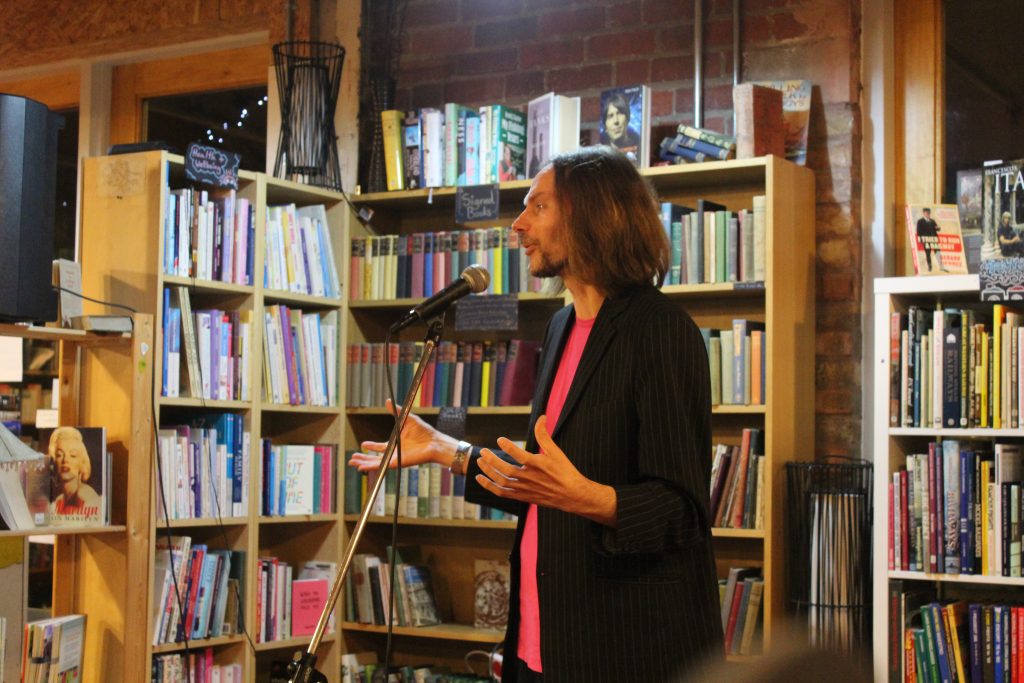
Ash Dickinson is a multiple slam champion – including Edinburgh, Cheltenham and BBC Radio. He has performed all over the world, and headlined many shows and festivals throughout the UK. The first book ever published by Burning Eye Books was Ash’s debut collection ‘Slinky Espadrilles’ – they loved it so much, they started a publishing company to get it out there! His second collection, ‘Strange Keys’ was also released by Burning Eye, and came out in 2016. Naturally, Ash is in great demand to run writing workshops and perform at events.
In April 2019, he headlined our Fire&Dust poetry night. We caught up with him after the gig, to ask a few questions…
What can audiences expect if they come to see an Ash Dickinson poetry set?
Entertainment. This should be a given for anyone standing in front of a paying audience but I’ve sat through too many therapist’s couch ego-trips to know this isn’t always the case. Remember your audience – it should be stamped across every microphone. You will laugh more than during your average poetry set, but you’ll also be moved and made to think; if I’ve done my job properly, this will all occur during the same poem.
When were you first inspired to start writing and performing poetry?
I had a teenage angst phase that arrived later and lasted longer than it ought to have done. I was uncommonly sensitive and emotionally articulate at 19/20, especially for a working class boy from the Midlands, and I needed an outlet for this. Throw in a passion for music/lyrics and oddball comedy and, though I say poetry writing came as a surprise, the earth for it was fertile. The performance side wasn’t as natural a development (read on), though I suppose I was always something of an extrovert trapped in an introvert’s body (and still am).
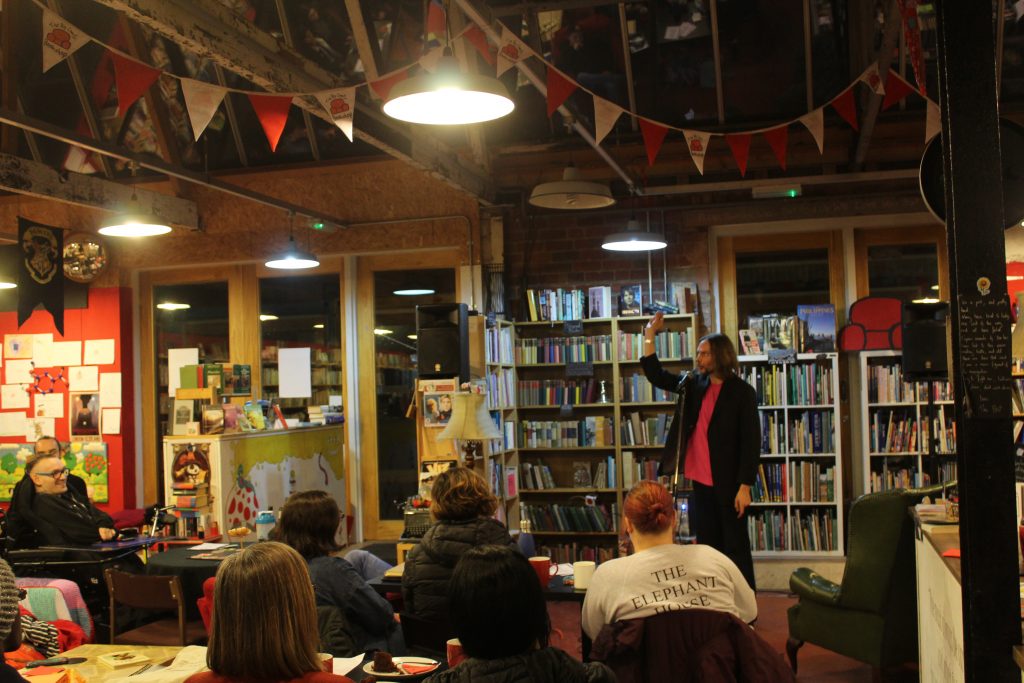
Who is your work aimed at – do you have an audience in mind when you’re putting a poem together?
A writer should write for themselves. Twenty-five years into this, I’ve developed a pretty good radar for when I’ve got something right. Authenticity, for me, is key for any art produced. I might write about my fridge falling in love with me or growing up a bear, but I have absolute conviction in that idea. If I don’t, or if I were to start directing work towards what I think an audience might like, you risk having no relationship with that piece, and both you and your audience will smell the insincerity a mile off.
Would you say there are recurring themes in your work?
I’m probably not the best judge of this. I believe few collections of poetry are as thematically diverse as my two books (part of the plan in organising a running order – for book or show – is that a piece should bear little or no relation to the one before it or after it. I like to keep an audience on its toes). Right now, I seem to be writing most about an exaggerated childhood, or of a connection with/hankering for nature, or of a general dissatisfaction with modern life. The latter, broad though that is, likely underpins more poems than anything else. Book three will probably come to be regarded as my Amish Period.
How did the experience of producing your second collection compare to putting together Slinky Espadrilles?
A perfect storm of my career growing just as Burning Eye homed into being, ‘Slinky’ was a collection of everything good I’d performed up to that point. Everything in that book was road-tested. You can smell the pints and backroom sweat as you turn the pages. ‘Strange Keys’ was a different experience. I used to think I’d failed as a writer if I wrote something I couldn’t perform; ‘Keys’ changed that. I could write longer, denser things that didn’t need to be performed – I now had a book for those pieces. ‘Slinky’ was 95% stage, 5% page. ‘Keys’ about 50%/50%. Book three might be 40%/60%.
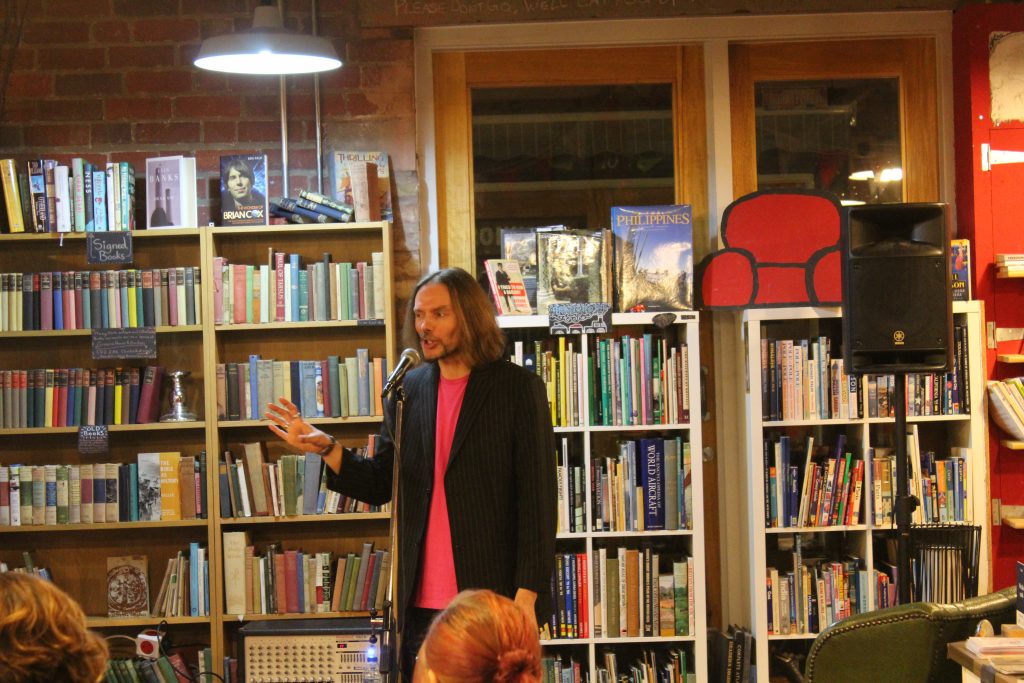
Do you feel there’s a difference between writing for the page and writing for performance?
I don’t set out specifically to write for either. Poems go the way poems go; some ideas turn out to be shorter, snappier, more immediate, more accessible. I don’t think, in truth, there is a completed poem I couldn’t perform – if I’m happy with it then it has something – but the difference is giving your audience a series of two minute singles or a ten minute jazz opera. Time length is probably pivotal; not only regarding the length of a set (I’d rather cover more thematic ground and keep the hits coming than spend seven or eight minutes on one piece) but in terms of attention spans. I used to think nothing of doing a five or six minute poem; now I might do a stanza of that poem. I blame mobile phones, as I do for most things.
Your poetry is entertaining with a sense of humour, and features plenty of standout imagery and well-crafted language. Talk us through your writing process?
My work is hopefully accessible and often funny, but it is certainly crafted. I’ve put the time in. I want your ear and your eye. My gestation periods can get out of hand, I can overwrite things I would have released sooner if I was doing the open mic scene of the same city week in week out, but time and effort is seldom wasted. Just one more hour… When someone, at a poetry night, reading from their phone, declares “I wrote this thirty minutes ago on the way here”, they might as well just announce “this is shit”. I want a poem to be ‘unimprovable’, to come into my set and declare itself undroppable. I’ve never understood those challenges like ‘write a poem every day for a year’. I’d rather write five crackers in a year than 365 mediocre poems.
I’ll brainstorm an idea, flood the page with a first draft – it’s always better to have too much than not enough – then tinker, slash, edit, rewrite, hone. Busy these days travelling from place to place for the poetry, I write most often on trains. This has changed my writing style somewhat from the days of bedsit-dwelling when I’d speak the words aloud as I wrote. I have discovered this tends to scare fellow passengers – so I speak in my head. In some cases I’ve probably traded a bit of hum-along musicality for complexity. This has hurt some poems, while transforming others.
Are you a big reader of poetry yourself? Which collections/performers have recently made an impression on you?
I’m a big reader, though I go through spells of that being poetry. If I think too much time has elapsed between reading verse I’ll make a concerted effort to get new things or revisit the ‘poetry shelf’. Collections I’ve read more than picked over recently (I dip in and out of poetry books) – Colette Bryce ‘Self Portrait In The Dark’, Luke Kennard ‘The Migraine Hotel’, Sean O’Brien ‘The Beautiful Librarians’, Melissa Lee-Houghton ‘Sunshine’, Terrance Hayes ‘How To Be Drawn’, Stephen Watt ‘Optograms’, Tom Weir ‘All That Falling’.
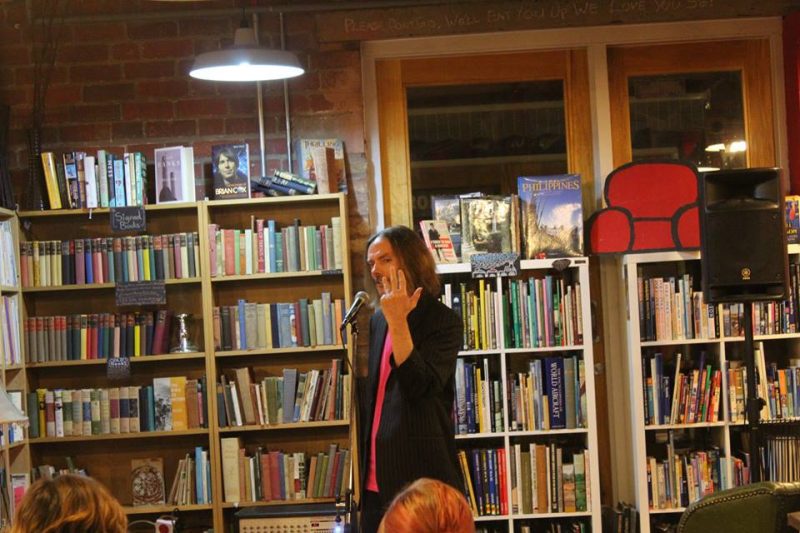
Is it hard work being a professional poet?
It’s hard work becoming one – or it should be. I’m a firm believer in the ’10,000 hours’ principle. Nothing of any value comes without effort, dedication and sacrifice. I work most days – if not doing a show or a workshop, then I’m writing, doing prep, looking after the (at times) mountainous admin side of things. I’m eleven years full-time professional as a poet, but the old adage of ‘find a job you love and you’ll never work a day in your life’ rings true to me. This rarely feels like work which, I suppose, is how it should be when you’ve turned a hobby into a vocation.
Several audience members commented on how captivating and inclusive your Fire & Dust set was. Have you always been a confident performer, or were you nervous when you first started? Any tips for our readers about how to improve their open mic performances?
I was hampered by nerves for years. I’ve performed in front of audiences over 1,500 times now, and it’s probably only the last 500-700 of these where I’ve had the confidence upon which your audience remarked. I’m fearless now, but was a painfully shy kid, inhibited and ashamed of being so, and so I embarked on a series of terrifying life crash courses, performing being one (solo world travelling another). I joined a writer’s group, tip-toed onto poetry stages, crashed music open mikes, attempted stand-up comedy for two or three years, did slams, threw myself into every uncomfortable and testing situation I could. I took a hard-knocks approach; now I can’t imagine what would phase me.
I would love to offer a piece of advice to a budding performer crippled by performance nerves that would instantly cure them, but for me it was just the experience of doing it again and again until it became merely something I do. Perform anywhere and everywhere you can. I temped for a number of years as I got the poetry off the ground and I can think of at least three workplaces where I did performances to colleagues at lunchtime including once on a stage constructed from pallets in a warehouse to traditional Scottish men whose idea of poetry (up to then) was the cartoon strips of the Daily Record. I just wanted it. I needed to get the words out. Any ‘captivation’ and ‘inclusivity’ is a combination of a slickness from honing this – practise, practise, practise, and an enormous love for what I do. If it burns in you, you will get good. You will force yourself to get good.
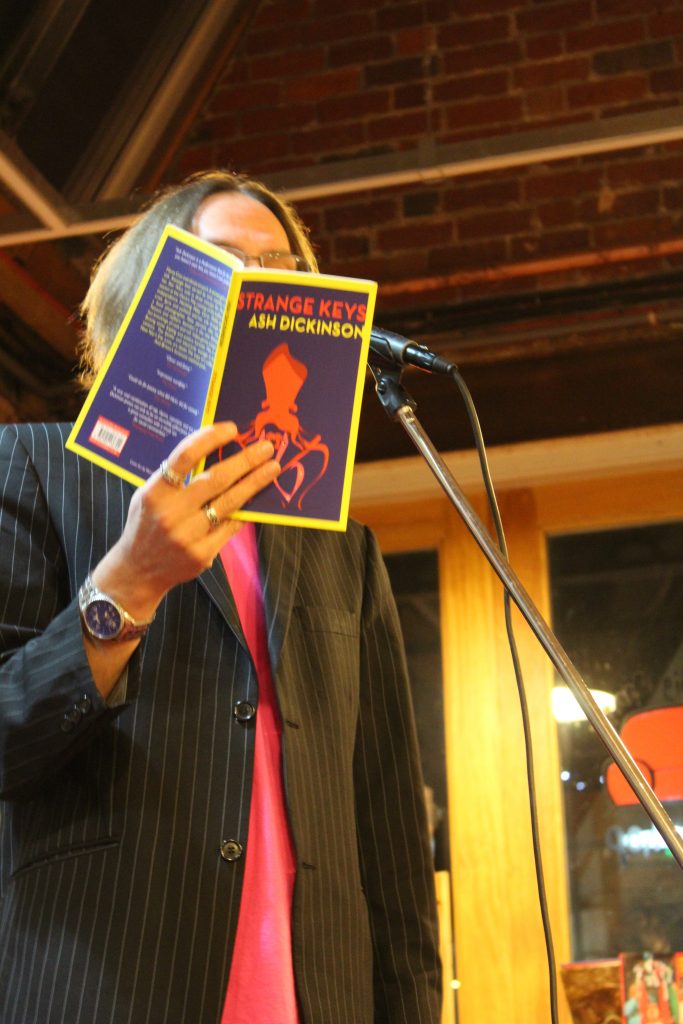
Where can people get hold of your books?
Burning Eye Books – Slinky Espadrilles
Burning Eye Books – Strange Keys
Amazon – Slinky Espadrilles
Amazon – Strange Keys
– and if you’d like a signed copy, please email me at mail@ashdickinson.com
What projects/performances have you got coming up next?
I have a book for younger years coming out imminently, and I’m writing towards my Burning Eye third collection (out 2021). Other than this, the never-ending tour rolls on…
Any other links/social media you’d like to plug?
Twitter: @ashdpoet Ash Dickinson Website Instagram: @method_poet Facebook: @ashdickinsonpoet
